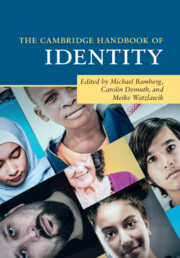Book contents
- The Cambridge Handbook of Identity
- The Cambridge Handbook of Identity
- Copyright page
- Contents
- Figures
- Tables
- Contributors
- 1 Identity: With or Without You?
- Part I The Origin and Development of the Concept of Identity
- Part II New Perspectives and Challenges
- Part III Methodological Approaches
- 11 A Narrative Practice Approach to Identities: Small Stories and Positioning Analysis in Digital Contexts
- 12 Conversation Analysis and Ethnomethodology: Identity at Stake in a Kinship Carers’ Support Group
- 13 Foucauldian-Informed Discourse Analysis
- 14 A Methodology to Examine Identity: Multimodal (Inter)action Analysis
- 15 Autoethnography
- 16 A Sociocultural Approach to Identity through Diary Studies
- 17 Positioning Microanalysis: A Method For the Study of Dynamics in the Dialogical Self and Identity
- 18 Synthesized or Confused Field? A Critical Analysis of the State-of-the-Art in Identity Status Research Methods
- 19 Criminals’ Narrative Identity
- 20 Experimentation within the Social Identity Approach: History, Highlights, and Hurdles
- Part IV Current Domains
- Part V Where Is Identity?
- Author Index
- Subject Index
- References
12 - Conversation Analysis and Ethnomethodology: Identity at Stake in a Kinship Carers’ Support Group
from Part III - Methodological Approaches
Published online by Cambridge University Press: 29 October 2021
- The Cambridge Handbook of Identity
- The Cambridge Handbook of Identity
- Copyright page
- Contents
- Figures
- Tables
- Contributors
- 1 Identity: With or Without You?
- Part I The Origin and Development of the Concept of Identity
- Part II New Perspectives and Challenges
- Part III Methodological Approaches
- 11 A Narrative Practice Approach to Identities: Small Stories and Positioning Analysis in Digital Contexts
- 12 Conversation Analysis and Ethnomethodology: Identity at Stake in a Kinship Carers’ Support Group
- 13 Foucauldian-Informed Discourse Analysis
- 14 A Methodology to Examine Identity: Multimodal (Inter)action Analysis
- 15 Autoethnography
- 16 A Sociocultural Approach to Identity through Diary Studies
- 17 Positioning Microanalysis: A Method For the Study of Dynamics in the Dialogical Self and Identity
- 18 Synthesized or Confused Field? A Critical Analysis of the State-of-the-Art in Identity Status Research Methods
- 19 Criminals’ Narrative Identity
- 20 Experimentation within the Social Identity Approach: History, Highlights, and Hurdles
- Part IV Current Domains
- Part V Where Is Identity?
- Author Index
- Subject Index
- References
Summary
Conversation analysis (CA) is an empirical approach to the study of social life that takes interaction in context as its primary focus. For CA, identity is something that people actively use, make reference to, and put to work, in order to bring about a social action or outcome. CA has been used in the study of gender identities, race, family roles, youth subgroups, and chatrooms, in mainstream media interaction, in studies of institutional exchanges such as in education, healthcare, advice and legal settings, and in sales environments, both online and face to face. To see what and how identities are achieved, CA explores sequences of embodied interaction, the primary source of data, carefully recorded and transcribed, so that we can identify patterns, including in how people bring off and attribute certain characteristics to their own and others’ membership of particular identity categories. In this chapter we provide a brief survey of the development of an ethnomethodological and conversation analytic approach to identity. We offer an example of a conversation-analytic procedure, looking at how kinship carers handle matters of family identity in a support group environment. We demonstrate how kinship carers interactively establish recognizable attributes and features of a common and valid identity in their complaints about the actions and dispositions of absent third parties. We end by considering how an ethnomethodological CA approach contributes to identity research, its limitations and its future directions.
- Type
- Chapter
- Information
- The Cambridge Handbook of Identity , pp. 262 - 284Publisher: Cambridge University PressPrint publication year: 2021
References
- 1
- Cited by

